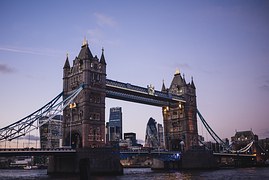Over
“Over” puede funcionar como preposición, adverbio, adjetivo o nombre. A continuación analizamos su uso como preposición.
1.- Preposición de lugar: Puede indicar tanto posición como movimeinto
1.1.- Posición: por encima (verticalmente)
1.1.a. Sin contacto físico entre los objetos:
The balloons fly over the valley
The helicopter flew over the demonstration
The tree’s branches move over the path
They have built a new bridge over the river
The girl holds a parasol over the old lady
After the storm the rainbow appeared over the horizon
The Tower Bridge crosses over the Thames
1.1.b.- Con contacto físico entre los objetos:
I put a blanket over my cat
My mother put a tablecloth over the table
The fireman put a handkerchief over his mouth
I wear a raincoat over my suit
1.2.- Posición: Al otro lado
My school is over the park
You can find the library over the street
The restaurant is over the bridge
1.3.- Posición: por todas partes o en muchas partes (all over)
It was raining all over the country
Our company has branches all over the world
The child has ink all over his trousers
After tha party there were bottles all over the place
1.4.- Movimiento: Cuzar de un lado al otro (movimiento que implica normalmente subir y bajar)
The horse jumped over the fence
The child jumped over the puddle
The platoon marched over the hill
1.5.- Movimiento: moverse a través de una superficie
The milk spilled over the floor
The tortoise walks over the grass
The lizard crawled over the wall
Could you come over here, please?
The boy slid over the snow
1.6.- Movimiento: Caer desde un lugar, o caer al tropezar
The rock fell over the cliff
The ball rolled over the edge of the swimming pool
1.7.- Dirección: mirar, señalar, hablar… por encima de
The thief looks over the fence
From this terrace there is a wonderful view over the beach
From the cliffs I could see over the sea
The neighbours greet over the hedge
2.- Preposición de tiempo
2.1.- Durante un periodo de tiempo o durante una actividad
I was in London over the Christmas
He can discuss that problem over a drink
Spain has developed over the last decade
The changes in living conditions over the last 40 years have been impressive
Our company has modernized over the last three years
You can talk me about your projects over the dinner
I worked in that bank over two years
I finished my report over the weekend
3.- Otros significados
3.1.- Por encima de, más que
The total investment is over one million euros
My dad is over eighty
I will stay in Paris for over one month
The child was crying for over half an hour
It was impossible to talk over the noise of the traffic
The cost of the ticket is over 100 euros
3.2.- Preferir, ser mejor, ganar (comparando dos cosas)
I prefer tennis over football
Why did you choose Paris over other cities?
Manchester United won 2-1 over Juventus
3.3- Superar una dificultad
It took me one week to get over the flu
Probably we are over the worst of this crisis
Edward has never got over his divorce
3.4.- Relativo a
The authorities are worried over the terrorist threat
They didn’t agree over the new project
They are always arguing over money
I need time to think over your offer
The dispute in the pub was over football
3.5.- Superioridad, control
That candidate triumphed over his opponents
The government has lost control over the army
The teacher should always maintain the authority over his pupils
A secta has a strong influence over its followers
The CEO has the Chairman over him
3.6.- A través de un medio de comunicación
We heard about the Prime Minister’s resignation over the radio
You shouldn’t talk about this subject over the phone
You can buy the tickets over the internet
3.7.- En divisiones
60 over 6 is 10
Diferencias:
A.- “Above” vs “Over”
1.- Preposición de lugar
Aunque el significado de ambas preposiciones es parecido existen algunas diferencias:
a) “Above” se utiliza cuando el objeto se sitúa por encima de la referencia pero sin tocarla.
The bird flys above the sea
b) “Over” tiene un uso más amplio. Se puede utilizar cuando hay contacto físico entre el objeto y la referencia.
He put a blanket over the the bed (encima de la cama, tocándola).
En este caso (hay contacto) no se utiliza la preposición “above”.
Pero la preposición “over” también se puede utilizar cuando no hay contacto, con un significado similar al de “above”:
The bird flys over the sea
Otros ejemplos:
A lamp hangs over / above the carpet.
He raised his hat over / above his head.
La preposición “above” (no “over”) también se utiliza para indicar que el objeto se sitúa en un plano superior (no literalmente encima):
The castle is above the lake
Por otra parte, “Above” se utiliza en referencia a una posición, nunca movimiento, mientras que “Over” se utiliza tanto con posición como con movimiento.
2.- Otros significados
También la preposición “Above” se utiliza igual que “Over” con el sentido de “por encima de, más que”, si bien su uso es menos frecuente y en algunos contextos no se utiliza.
Por ejemplo:
Only persons over / above 18 years old can vote in the general elections
Yesterday night the temperature was over / above 30 degrees
It is impossible to hear you over / above all the noise
Ejemplos donde no se utiliza “Above”:
I was playing tennis over two hours (NO: … above two hours)
There were over 100 persons in the party (NO: … above 100 persons)
B.- “Across” vs “Over"
1.- Ambas se utilizan para indicar que algo / alguien cruza de un lado a otro:
The bridge stretchs across / over the river
There was a barrier across / over the road.
2.- Ambas se utilizan también para indicar que algo se encuentra al otro lado en relación con el que habla:
The theater is just across / over the street
The cinema is just across / over the square
3.- También se utilizan para referirse a movimientos de un lado a otro (cruzar), sobre una superficie: cruzar una calle, un puente, un parque, una frontera, un río...
Mary jumped across / over the stream
The bus came across /over the bridge.
Se prefiere “over” cuando el movimiento implica elevar la posición:
The horse jumped over the fence
Peter jumped over the Wall
Se prefiere “across” cuando se el movimiento es a través de una superficie plana o es un movimiento sobre el agua.:
The dogs run across the park
The soldiers marched across the desert
When I went to England I flew aross the sea
We swam across the lake.





